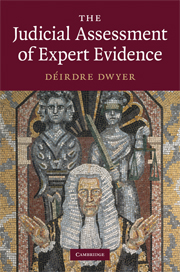Book contents
- Frontmatter
- Contents
- List of figures
- Preface
- Table of legislation
- Table of cases
- Introduction
- 1 General epistemological issues
- 2 Expert evidence as a special case for judicial assessment
- 3 Making sense of expert disagreement
- 4 Non-epistemological factors in determining the role of the expert
- 5 Assessing expert evidence in the English civil courts: the sixteenth to twentieth centuries
- 6 Assessing expert evidence in the English civil courts today
- 7 The effective management of bias
- Conclusion
- Appendix 1 Part 35 of the Civil Procedure Rules 1998
- Appendix 2 Tables of pre-1800 civil cases involving expert evidence
- Bibliography
- Index
- References
6 - Assessing expert evidence in the English civil courts today
Published online by Cambridge University Press: 01 July 2009
- Frontmatter
- Contents
- List of figures
- Preface
- Table of legislation
- Table of cases
- Introduction
- 1 General epistemological issues
- 2 Expert evidence as a special case for judicial assessment
- 3 Making sense of expert disagreement
- 4 Non-epistemological factors in determining the role of the expert
- 5 Assessing expert evidence in the English civil courts: the sixteenth to twentieth centuries
- 6 Assessing expert evidence in the English civil courts today
- 7 The effective management of bias
- Conclusion
- Appendix 1 Part 35 of the Civil Procedure Rules 1998
- Appendix 2 Tables of pre-1800 civil cases involving expert evidence
- Bibliography
- Index
- References
Summary
6.1 Introduction
The previous chapter took us from the end of the fifteenth century through to the end of the twentieth century in considering the judicial assessment of expert evidence in the English civil courts. This journey looked at the range of expert roles that have existed historically in the civil courts (party expert witnesses, special juries, assessors and court experts), both under the several jurisdictions that existed prior to the Judicature Act 1873 (common law, equitable and civilian), and subsequently under the fused jurisdiction of the Supreme Court, whose procedure was governed by the Rules of the Supreme Court (‘RSC’). Our journey ended in 1998, on the eve of the introduction of the Civil Procedure Rules 1998 (‘CPR’), which came into force in April 1999. This chapter analyses the operational veritistic value of the expert roles provided for under Pt 35 of the CPR (party experts, single joint experts and assessors).
The CPR are intended to be ‘a new procedural code with the overriding objective of enabling the court to deal with cases justly’ (CPR r. 1.1). Implicit in this statement are five elements of the paradigmatic shift that was intended to distinguish the CPR from the RSC. First, it is ‘new’, and this implies a break with the RSC rather than a progression. Secondly, ‘code’ is a legal term of art, that carries with it a sense of self-containment and completeness that is not equally true of ‘rules’.
- Type
- Chapter
- Information
- The Judicial Assessment of Expert Evidence , pp. 282 - 333Publisher: Cambridge University PressPrint publication year: 2008

